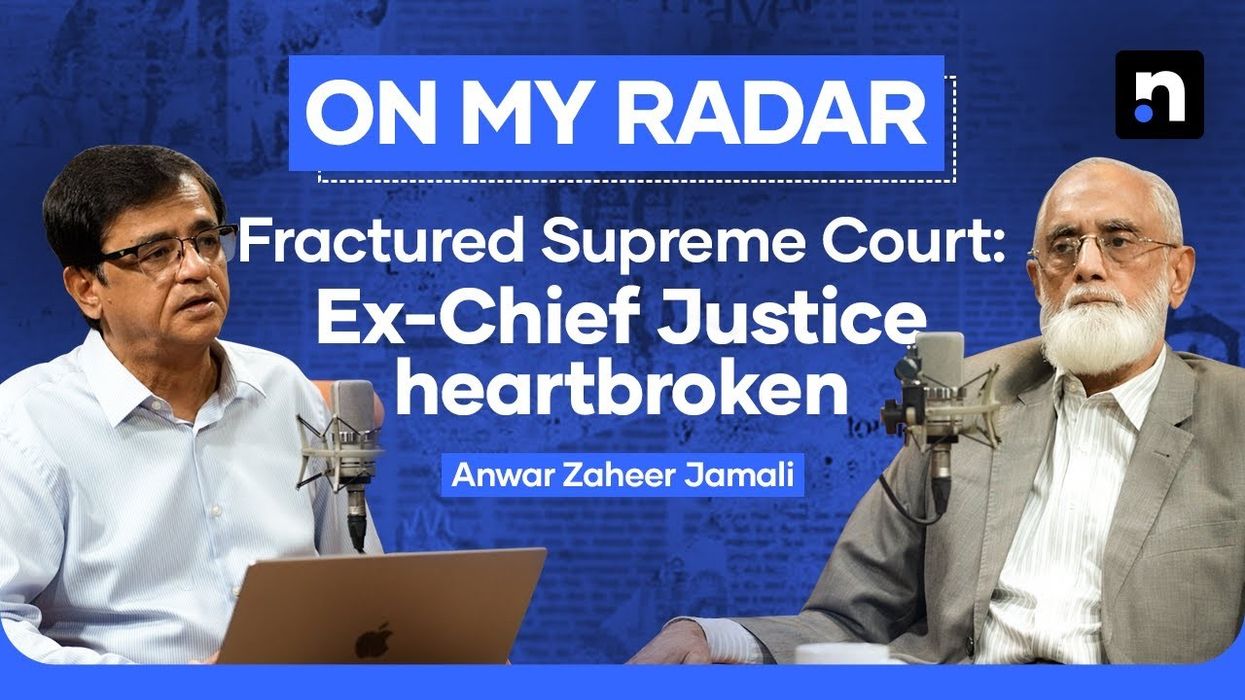The heartbroken former chief justice of Pakistan
Former chief justice Anwar Zaheer Jamali likened the severity of Nawaz Sharif’s lifetime disqualification "to punishing a minor theft with a death sentence."
News Desk
The News Desk provides timely and factual coverage of national and international events, with an emphasis on accuracy and clarity.
- Jamali emphasized the need for a grand national dialogue to resolve the dysfunctional state of politics and governance in Pakistan.
- Jamali also criticized the ineffectiveness of the Supreme Judicial Council in holding judges accountable, citing the case against Chief Justice Qazi Faez Isa as an example.
Pakistan's former Chief Justice Anwar Zaheer Jamali says in the current "polluted environment", the differences in opinion between the judges of the Supreme Court of Pakistan "are not based on merit but due to personal grudges."
"The judges spend as much time fighting amongst themselves as they do conducting the proceedings," said the former chief justice in an exclusive conversation with Nukta CEO Kamran Khan on his brand new show On My Radar.
Jamali told Kamran Khan that "every judge wants to create his or her own little center of power".
Panama Papers case: "Punishing a minor theft with a death sentence"
Sharif was never charged for the crime which led to his disqualification in the Panama case, Jamali said, when Khan questioned the former chief justice about whether "external factors influenced the decision."
Anwar Zaheer Jamali was chief justice when the Supreme Court took up the Panama Papers petition, which eventually led to the lifetime disqualification of three-time prime minister Nawaz Sharif, setting off a series of events that brought Imran Khan to power as prime minister.
Jamali retired as chief justice before hearings began in the Panama case. The On My Radar podcast is the first time the former chief justice has spoken about the judgement.
“Where did the issue of the 'iqama' come from? I have read the petition, page by page, and there was no mention of the word 'iqama' in it. The charges in that petition were related to the flats in London."
Sharif was sentenced to 10 years in prison and fined $10.6 million on corruption charges linked to the 2016 Panama Papers revelations about his family's properties overseas.
After a lengthy trial and much courtroom drama, the judges were unable to establish a link between alleged money laundered from Pakistan and the apartments his family owned in Avenfield House, an upscale location in London.
He was hence disqualified from office over failing to declare a small income stemming from a residence permit (iqama) for the UAE.
Kamran Khan asked the former chief justice about his impression of the Panama judgement, "A historic case was tried, leading to a decision that stated it seemed like the Sicilian Mafia did this. You must have seen that judgment since it began with you."
Former Chief Justice Anwar Zaheer Jamali replied that a defendant can only be convicted based on charges explicitly presented in court.
"The law of the court states that if a defendant is charged with three allegations in a criminal case, you can only convict him based on those three charges. You cannot say, well, he was not proven guilty of those, so let's charge him with a fourth allegation'" said Jamali.
He likened the severity of Sharif’s lifetime disqualification "to punishing a minor theft with a death sentence."
Letters by high court judges
Referring to a letter written earlier this year by six judges of the Islamabad High Court that addressed the interference of Pakistan's military establishment in their work, Jamali stated that the chief justice should have taken a stronger stand on this matter.
Kamran Khan asked the former chief justice, "Subsequently, three High Courts subscribed to and supported this. How significant is this incident?"
"What could be more significant than this?" Jamali responded. "The cognizance that needed to be taken was not taken as it should have been. The six judges who collectively submitted a request to the Supreme Court include many whom I appointed."
Dismissal of Justice Shaukat Siddiqui
On the controversial dismissal of Justice Shaukat Siddiqui in 2018 by the Supreme Judicial Council, Jamali stated that that while Siddiqui's remarks about military interference were ill-advised, a warning could have sufficed instead of an immediate dismissal.
"Justice was eventually served to that honest man, despite the injustice he faced," said the former chief justice. Siddiqui was expected to become the next Chief Justice of Islamabad High Court and, yet he was harassed.
Violations of Supreme Court orders
Jamali also criticized the failure to implement Supreme Court orders effectively, raising concerns about new laws enacted against existing rulings.
He warned, “When one bench disagrees and the minority states that the majority decision is not binding, what is left?”
He emphasized the importance of upholding the law and expressed concern over the erosion of judicial authority.
Several Supreme Court orders were not implemented in recent years, including the July 12 verdict on reserved cases
Criticism of past chief justices
Jamali was critical of several judgments made by former Chief Justices Iftikhar Chaudhry, Gulzar Ahmed, and Saqib Nisar.
He expressed concerns over actions that led to the demolition of residential buildings and decisions regarding national resources, including cases related to the Rekodiq mining project, the Turkish power firm Karkey, and the privatization of state-owned Pakistan Steel, which resulted in billions of dollars in losses for the country.
Institutional overreach
Jamali reiterated that while Pakistan's Constitution aims to uphold the separation of powers among the legislature, executive, and judiciary, persistent interference among these institutions undermines this principle.
He traced the decline of judicial integrity to external control that began as early as 1956 and was exacerbated during the era of military ruler Ayub Khan.
“The judiciary cannot absolve itself of past shortcomings,” he said, stressing that interference in judicial matters has become a recurring issue.
When Khan asked whether it is the superior judiciary's job to call for a grand national dialogue to resolve the current dysfunctional state of politics and governance, Jamali replied, "We haven't even reached consensus on small issues - this is the level of division."
Ineffectiveness of the Supreme Judicial Council
Jamali said the effectiveness of the Supreme Judicial Council, the body responsible for judicial accountability, has suffered a blow. He lamented that, while the council appears to be a significant institution on paper, it has effectively been rendered powerless.
He cited the case against incumbent Chief Justice Qazi Faez Isa, noting that it never reached the council, where it should have been decided, demonstrating a failure in the accountability process.
It was alleged that properties belonging to Isa's wife were actually his own.
Isa's wife successfully challenged the order, establishing that she had independent means of livelihood and was a separate taxpayer. Later, in 2022, former Prime Minister Imran Khan admitted that filing the reference against Isa had been a "mistake."
Former Chief Justice Anwar Zaheer Jamali's tenure
He was elevated as judge of the Supreme Court of Pakistan on August 03 2009, becoming the 24th Chief Justice of Pakistan in September 2015.
He retired from his post on December 30, 2016.
He took up 20 suo motu cases as chief justice, mostly related to the poor state affairs in his home province Sindh.
Two weeks before he retired, on December 11 2016, Jamali said of the Panama case that the judiciary does not decide cases to please anyone and it is not influenced by media hype either.
Critics say Anwar Zaheer Jamali's tenure as chief justice was "benign", and he did not leave behind a notable legacy, including missing the opportunity to hold judge's accountable through the Supreme Judicial Council.











Comments
See what people are discussing